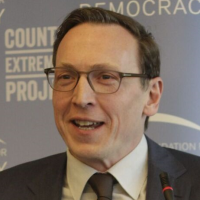The Benefits of Reviving Transatlantic Armaments Cooperation

Alexander Ritzmann
Counter Extremism Project
Alexander Ritzmann is a DAAD/AICGS Research Fellow from March to June 2023. He has been working on the promotion of liberal democracy and human rights and on the prevention of violent extremism and terrorism for twenty years. The German Bundestag, the European Parliament, and the U.S. House of Representatives have invited him to testify on these subjects. He regularly advises the German federal government and the EU Commission on security matters.
Alexander is a senior advisor with the Counter Extremism Project (CEP) Berlin, where he focuses on the effective countering of extremist/terrorist actors, in particular on violence-oriented far-right extremist (transnational) networks, offline and online. He is also advising the European Commission’s Radicalization Awareness Network (RAN), where he particularly focuses on extremist ideologies, narratives, and strategic communications. From 2018 until the end of the project in 2021, he co-developed and facilitated the “International Forum for Expert Exchange on Countering Islamist Extremism” (InFoEx) at the German Council on Foreign Relations (DGAP), where he still serves as an associate fellow.
During his time at AICGS, Alexander will focus on his research project “White supremacy 3.0 and the possible militarization of combat sports networks in the context of the Russia-Ukraine war.” His research addresses developing and pressing challenges for the national security of the United States and Germany, as well as the transatlantic security cooperation between the two countries. His research will focus on two national security challenges:
1. The new “white supremacy 3.0” strategy by U.S. REMVE (racially or ethnically motivated violent extremism) “Active Clubs.” The main research question is to what degree this new strategy of mainstreaming (professional focus on popular aesthetics and music) and REMVE combat sports is already anchored in different U.S. REMVE milieus, to what degree it is being exported to other countries, especially Germany.
2. The militarization of RWE (right wing extremism)/REMVE combat sports networks: The main research question will investigate to what degree, and in the context of the Russian-Ukrainian war, RWE/REMVE combat sports networks in the EU and the United States are cooperating and how such networks could be used to plan and execute attacks or to grow from a combat sports focus to a military/militia phenomenon, also by connecting with existing RWE/REMVE militias.
The research will produce policy recommendations for the United States and Germany.
Policy Report 46
During the Cold War, Germany and the U.S. fostered close arms cooperation and development. Yet, after German unification, Germany focused on developing and procuring armament systems either domestically or within the EU. In Policy Report #46, Senior Non-Resident Fellow Alexander Ritzmann argues that German-American defense cooperation could once again become an area in which transatlantic cooperation helps to overcome challenges. Ritzmann offers some concrete policy recommendations to the U.S. and German governments to increase transatlantic defense cooperation and outlines what has led to the current lack of cooperation.








